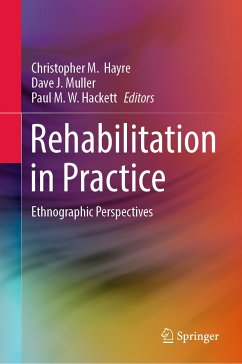This book focuses on developing the use of ethnographic research for rehabilitation practitioners by recognizing its value methodologically and empirically in the field of rehabilitation. The very nature of ethnographic research offers an array of opportunities for researchers to understand the social world around them. The book identifies the multifaceted use of ethnographic methods in the rehabilitation setting. It touches on how acute and chronic conditions can affect the nature of ethnographic work in attempts to offer originality in a range of rehabilitation settings. Readers will find this collection of examples useful for informing their own research, and it aims to enlighten new discussion and arguments regarding both methodological and empirical use of ethnographic work internationally.
Dieser Download kann aus rechtlichen Gründen nur mit Rechnungsadresse in A, B, BG, CY, CZ, D, DK, EW, E, FIN, F, GR, HR, H, IRL, I, LT, L, LR, M, NL, PL, P, R, S, SLO, SK ausgeliefert werden.









